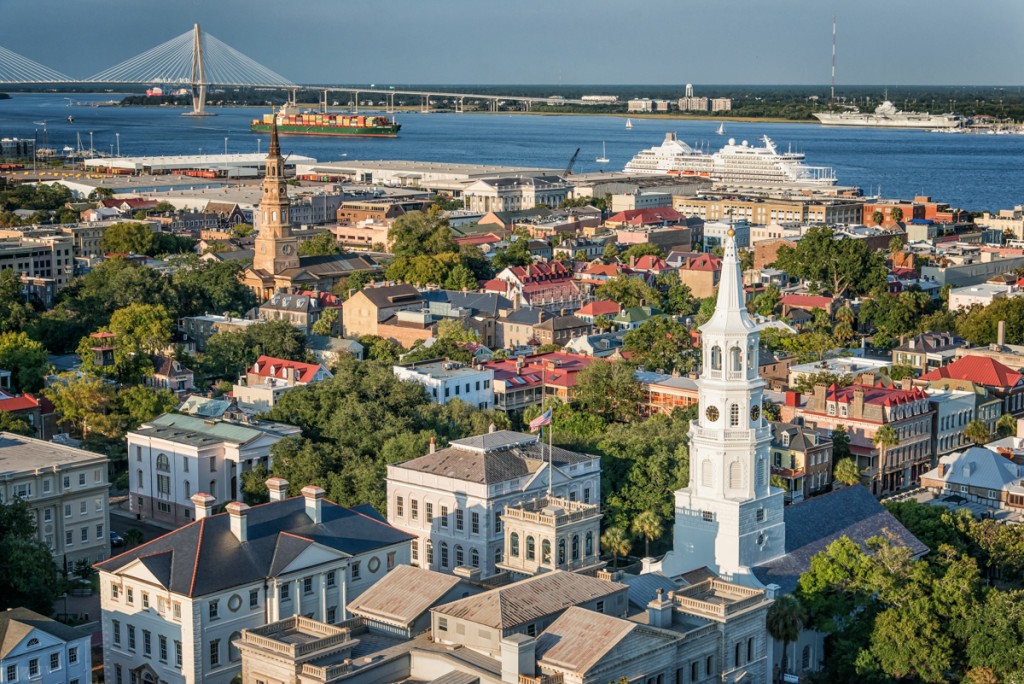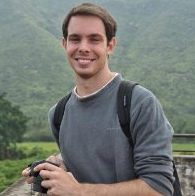Making It, Local
 Some people come to college for four–okay, maybe five–years and leave shortly thereafter to ply their trade and develop their talents on the broader national and international stage. Our English alumni live in 46 different states and a handful live abroad in places Germany, Canada, England, and Nicaragua.
Some people come to college for four–okay, maybe five–years and leave shortly thereafter to ply their trade and develop their talents on the broader national and international stage. Our English alumni live in 46 different states and a handful live abroad in places Germany, Canada, England, and Nicaragua.
But a substantial number of CofC English alumni have chosen to stay right here in Charleston, SC and its immediate environs–over 1,000 in Charleston alone, in fact. This article is the first in an ongoing feature in Folio called “Making It, Local”–a series that explores the work and lives of the many literati who call Charleston home. The four alumni featured below work in a variety of fields—from education and community arts, to conservation and real estate. Of course, we are also very eager to profile alumni doing interesting things wherever that may be and at any life stage: if you would like to be featured in future installments, please let me know by filling out our English Alumni Update form and select the box indicating your interest.
Charles Carmody
 Job:
Job:
Director, Charleston Music Hall
Why Charleston?
“Charleston has so much potential, and I have found new meaning and life in this city through my work in the arts and music world.”
[toggle title_open=”Read Less” title_closed=”Read More about Charles” hide=”yes” border=”yes” style=”default” excerpt_length=”0″ read_more_text=”Read More” read_less_text=”Click for a full position description” include_excerpt_html=”no”]
How did you land your job?
I asked for the job. I was looking for a job in Charleston and secured a meeting with Michael Bennett, owner of Bennett Hospitality, and I thought he would be a great brain to pick. He mentioned that he owned the Charleston Music Hall in the meeting, that no one was running the building, and that he did not know what to do with the space. Fireworks went off in my head. I went home and wrote him a letter thanking him for the meeting and mentioned that I wanted to talk more about the Music Hall. I mailed the letter and got a call two weeks later. Mr. Bennett thanked me for my letter and asked me to come back into the office to discuss what I would do with the place. I went ahead and wrote out a ten-page business proposal about what I would do if I ran the Hall and pitched him the idea. He hired me on the spot.
What compelled you to stay in Charleston after graduation? I know you flirted briefly with the Great Up North.
I ran for the hills (quite literally) the second I graduated from C of C. My friend Justin and I packed up my VW Rabbit and drove out to British Columbia. I am from Charleston, and I wanted to experience some new places. However, things were rough out West, and I could not land a job (mostly because I was aimlessly wandering around without knowing what I wanted to do). I ran out of money pretty quickly, and my Mom had to fly out to Seattle, and we had a Mother-Son road trip back home, which was depressing and amazing. This time was my six-month wanderjahr. My plan was to leave Charleston until I got the job at The Music Hall, and I am very happy that I stayed. Charleston has so much potential, and I have found new meaning and life in this city and my work in the arts and music world.
Why did you decide to major in English, and how has that decision affected your broader career trajectory?
I went through almost every major at C of C and found that English made the most sense for me. I enjoyed the interdisciplinary feel of the English major. Personally, I love to read and write, and the English major certainly developed my reading and writing skills. On a professional level, my English major developed my critical thinking, the way I make decisions, and the way in which I interact with the plethora of people involved in the music industry. The English major helped me to take narrow scopes and minute details and incorporate them with a larger context. Running a venue involves so many intricate details that one must incorporate into a larger context on a daily basis: from programming and whether or not a show evokes the mission statement of the Hall, to the scheduling of over 250 volunteer ushers and full- and part-time staff, to marketing over 200 shows each year, one must be able to focus on the minute details without losing the importance of the establishment as a whole. A broad education in the liberal arts forces one to think about the big picture, and the English major is precisely a big-picture major. The English major also developed my strong appreciation, love, and respect for the spoken and written word. Language is a mighty tool that the English major taught me to wield.
Any highlights from your time as an English major?
Definitely drinking beer in the student center and watching Nigerian films for my Nigerian Film and Literature class. On a more serious note, I thoroughly enjoyed my English classes from Short Short Fiction to Whitman to 20th Century War Literature; I loved discussing a variety of topics, genres, criticisms, philosophies. The English major truly is a diverse major, and this love of diversity is what motivates me in my current position, as I try and create diverse programming at the Music Hall in genres that range from from film and theater, to concerts and conferences.
What’s the coolest thing you’ve experienced as director so far?
Being the Director of the Music Hall definitely has its odd perks. I have bowled with Bill Murray and Keb’ Mo’ twice now. I have gotten to meet some of my music idols, such as Sam Beam, Jeff Mangum, and Glen Hansard. I am helping to develop a TV series for PBS called “Live at The Charleston Music Hall,” and I get to go into work every day and truly love what I do and deeply care about the job I am doing. The best part of the job is the feeling right as the band or artist takes the stage. So much work goes into planning and creating a show, and to feel the electricity of 966 people screaming and having and great time and communing is truly amazing. One of the best experiences was to watch my friends’ band Brave Baby sell out the Music Hall in Charleston. They are a Charleston band, and to have watched them develop and get to that level is phenomenal.
[/toggle]
Katie Zimmerman
 Job:
Job:
Program Director, Coastal Conservation League
Why Charleston?
“Charleston needs a lot of help, and I wanted to stay put and be part of making Charleston a better place. Many environmentalists head out west or to New England, but Charleston is important to me, and I want to make a positive impact.
[toggle title_open=”Read Less” title_closed=”Read More about Katie” hide=”yes” border=”yes” style=”default” excerpt_length=”0″ read_more_text=”Read More” read_less_text=”Click for a full position description” include_excerpt_html=”no”]
You have a very interesting academic background that blends English, Political Science, and Environmental studies. Can you describe how your degree in English in particular contributed to this broader set of interests?
Reading and writing have always been serious passions of mine. When I started at the College of Charleston, I was allowed to skip the basic English prerequisite courses because of my high school AP scores. Having the opportunity to jump right in to analysis of classic literature was absolutely the best thing for me. I really enjoyed being around “older” students (sophomores to my lowly freshman status) and I quickly confirmed what I had already decided as a child: that I wanted to be able to read and write as much as possible for the rest of my life, preferably in my professional work. I decided to major in English simply because I loved it. I wasn’t necessarily thinking about career paths. But I also was passionate about environmental advocacy and politics, so the end result was to major in English and let those skills enhance everything about my ability to convey the environmental and political information I was gleaning through my minors. I firmly believe that my English coursework helped me by constantly honing my research, writing, and analysis skills. But it is also simply interesting and fun to read literature and be inspired by the various perspectives on nature and how those perspectives might help inform how I approach and relate to communities on environmental issues. And certainly Henry David Thoreau became one of my gurus.
What was a favorite English class from your time at CofC?
My favorites have always been the Transcendentalists, but I had a lot of classes that were amazing. My sophomore year was one in which the Vietnam War was a theme across several departments, so I loved the class Literature of the Vietnam War—Tim O’Brien came in and did a reading. I also enjoyed Women’s Literature. But my standard favorite was, of course, American Literature.
What compelled you to remain local after graduation? What draws you to the Charleston area in general?
The College of Charleston is unique in that it isn’t an isolated campus separated from the community of Charleston—it is entwined and entangled with the City. Therefore, the opportunities to learn as a college student by being a part of a community are everywhere. I was immediately attracted to that feature and it influenced much of my research throughout both undergraduate and graduate studies at the College. But Charleston also needs a lot of help, and I wanted to stay put and be part of making Charleston a better place. Many environmentalists head out west or to New England, but Charleston is important to me, and I want to make a positive impact. I also had a wonderful mentor who helped put me on a path to going to the Master of Environmental Studies Program at CofC and then working to become a staff member at the Coastal Conservation League.
Can you describe in more detail what you do as Program Director for the Coastal Conservation League? What’s your favorite part of your job?
Being a Program Director at the Coastal Conservation League encompasses a great deal. I direct our organization’s Air, Water, & Public Health Program, which means my work ranges from checking public permit notices, to researching issues, to writing ordinances and state laws, to interacting with the media and submitting op-eds, to organizing grassroots citizen coalitions to enact change. My major issues of focus over the past few years have included pushing for local cruise ship regulations; getting safer and connected bike and pedestrian access; protecting the Angel Oak and Captain Sams Spit from development proposals; working on local plastic bag bans; organizing against seismic testing and offshore drilling in the Atlantic; encouraging developments to incorporate smart growth features; and working with various organizations to put large swaths of land into conservation. My favorite part of the job is the fact that it is truly meaningful and important work.
[/toggle]
Matthew Foley
 Job:
Job:
English, Charleston School of the Arts
Why Charleston?
“What keeps me here is Charleston’s potential and the opportunity to help build artistic movements that haven’t previously existed here. I’m sure every creative-minded person in Charleston feels the occasional temptation to move to a bigger city, one that might offer a pre-existing community that might better support their vision. I think it’s important to remember, however, that every vibrant artistic community exists because a group of people decided to stick around and nurture the artists who were there.”
[toggle title_open=”Read Less” title_closed=”Read More about Matthew” hide=”yes” border=”yes” style=”default” excerpt_length=”0″ read_more_text=”Read More” read_less_text=”Click for a full position description” include_excerpt_html=”no”]
You wear many hats: youth advocate, teacher, community organizer, performer, poet. How do you find the time and energy for all of this? And how does it all connect?
Like most people these days, I often struggle to find the time and energy to get everything done and successfully wear all those hats you mentioned. In fact, I feel tired just thinking about it! But ever since my days as a College of Charleston student, I’ve felt a calling to use whatever talents I have to do some good in the world. In my college years, I was always getting involved in community service projects and social justice programs. In fact, I came very close to failing a few English classes because I was too busy starting up clubs and organizations to save the world. Though I’ve done a lot of growing up since college, I’m still basically searching for a way to use my talents to make the world a better place. The major thread that runs through much of my work now is the need we all have for deeper meaning in life, beyond just checking things off our To-Do Lists. As a teacher, I see this need in young people all the time. Each year, my classroom is full of students with emotional, social, and spiritual needs that aren’t being adequately met by quizzes, tests, and projects. They desperately need something more from the adults in their lives beyond banal advice and a state-approved curriculum. I believe the arts have a crucial role to play in filling these needs, which is why I was attracted to working at School of the Arts and why I started the Holy City Youth Slam organization. In my own life, I’ve seen how reading and writing poetry have been powerful allies in getting me through difficult times and providing meaning when things have seemed meaningless. Much of my work in the community revolves around spreading this power of creativity and self-expression to provide us with a deeper appreciation of life.
As this profile series is on alums who have remained in Charleston and carved out a dynamic existence, I’m curious what drew you to remain in the Charleston area after graduation?
Although I’ve traveled a good deal since graduating from the College of Charleston in 2008 (for instance, I lived abroad for six months in Thailand teaching English as a foreign language), I keep returning home to Charleston. I think what keeps me here is Charleston’s potential and the opportunity to help build artistic movements that haven’t previously existed in Charleston. I’m sure every creative-minded person in Charleston feels the occasional temptation to move to a bigger city, one that might offer a preexisting community that might better support their vision. I think it’s important to remember, however, that every vibrant artistic community (whether you’re talking about New York City, San Francisco, Boulder, or Austin) exists because a group of people decided to stick around and nurture the artists who were there. Greenville SC, for instance, has a very vibrant poetry slam scene and after traveling up there a few times to participate in slams, I started feeling frustrated that Charleston didn’t offer the same opportunities for slam poetry. Then it dawned on me: someone here has to build it. So, with the help of some friends, I started organizing the Holy City Slam (for adults) and Holy City Youth Slam (for ages 13-19). If you feel frustration that your town doesn’t have the artistic opportunities you wish it had, I think that is the Universe’s way of telling you: get busy and create them.
In what ways did your English major prepare you for your career?
I had a really incredible experience as an English major at the College of Charleston and feel really grateful for many of the professors I studied under. Hands down, my favorite experience as a college student were the two independent studies I did with two professors in the English department–Conseula Francis and Chris Warnick. I love the amazing course titles we came up with: “Social Protest in the African American Literary Tradition” and “Critical Pedagogy and the Teaching of Writing.” I appreciated the opportunity to explore interests that I was personally passionate about and feel immensely grateful that these professors were willing to go out on a limb to support my crazy academic interests. I feel that those experiences provided me the priceless opportunity to develop my own unique voice as a writer and thinker. You really can’t ask for more as a student.
“Poetry makes nothing happen,” as W.H. Auden says. Of course, the next thing he says in that poem is that it survives in areas where executives wouldn’t want to tamper, in quiet towns, and so on. Where does poetry live for you, and what can it accomplish in the world?
I try to resist the temptation to define poetry as any one particular thing, or existing in only one place. I’ve had profound experiences shouting poems in a packed poetry slam, but I’ve also written my fair share of poems sitting by a creek in a quiet forest. We love to divide poetry into various camps and contrasting movements: “academic poetry” vs. “performance poetry,” or “page” vs. “stage.” The poets I really admire tend to blur these lines, not limiting themselves to the labels of “spoken word poet” or “page poet.” In my own work, I often try to challenge myself to approach topics from unusual perspectives, or develop the poem in unexpected directions. In the world of poetry slam, for instance, there is a common perception that slam poems must be angry, fiery, and political. In one of my favorite slam workshops for youth, however, I take them through exercises to incorporate humor and lightheartedness in their work – even if they are discussing an important social issue or personal story. When we assume our poems must tackle certain topics or adopt certain perspectives to be accepted by readers, we lose our originality as artists. Therefore, I believe poetry’s role in the world is as diverse as poems themselves. Some poems will remind us to return to nature for inspiration, some will have us look to crowded city streets for insight. Some poems will cause us to be reflective, some will challenge us to becoming politically involved. Poetry is all of the above.
Can you say something about your career trajectory? You’ve taught at a number of different schools in the area. Where do you see yourself in 5 years? What’s your “ideal” job?
Like many adults, I’m still trying to figure out what I want to be when I grow up! For the past four years, I’ve worked as a classroom English teacher on both the middle and high school level. Teaching in the public school classroom is an incredibly rewarding yet intensely demanding way of life. I think I’ll always be a teacher in some capacity, but I definitely see myself branching out in the coming years, perhaps teaching creative writing or English at the college level. I could also see myself continuing my work with youth & the arts outside of a school setting, perhaps on the non-profit level. As a poet, I’m always looking for ways to grow and challenge myself. My next poetry project is a big departure from the slam-oriented work I’ve done in years past. I’ve been a long-time practitioner of yoga & Buddhist meditation and have always wanted to create poems exploring that territory. So, I’m collaborating with a musician friend of mine to create an album of music & poetry for meditation that will be called The Dharma Tapes. I hope to have that project completed within the next six months.
[/toggle]
Steve Trice
 Job:
Job:
Marcom Manager, BoomTown Real Estate Web Platform
Why Charleston?
“The slowness of Charleston is what I value. Living in Guangzhou, China was like living in a bee-hive. Busy, busy everyday — and after a while I just wanted something like home again. Calm, no rushing, beautiful weather where I can dig my feet into the sand and relax. Also, Charleston has a lot of growing opportunities that people don’t speak of beyond the hospitality and tourism sectors. Tech industries are growing rapidly, and it’s easy to be a part of a new business endeavor.”[toggle title_open=”Read Less” title_closed=”Read More about Steven” hide=”yes” border=”yes” style=”default” excerpt_length=”0″ read_more_text=”Read More” read_less_text=”Click for a full position description” include_excerpt_html=”no”]
What kinds of interests led you to your current job at BoomTown. Did you have a long-standing interest in real estate? Or did you have any other majors or minors that helped position you for this opportunity?
The main interest that led me to BoomTown was my enjoyment for writing. I’ve always enjoyed different forms of writing. After I graduated, I moved to China and worked as an English teacher. It wasn’t long before I started publishing children’s stories for my school organization and ventured into travel writing. When I moved back to the States, I knew I wanted to continue writing. I was eventually hired as a content writer for BoomTown, which involved writing city guides and marketing materials for real estate businesses. I knew nothing about real estate, so I had to quickly get up to speed on the industry (plus learn a lot about SEO and advertising).
The one thing I love at my work is having the chance to get creative. I’m involved in a lot of projects that let us break the norm on traditional marketing and try new things.
Because I had a creative writing focus, I think those classes prepared me the most. I think Dr. Devet would be happy to know, I learned a ton from her Technical Writing class. It helped me hone my skills, especially in terms of the mechanics of good writing. The creative writing classes also helped me regularly practice the craft. The key was being able to practice the craft and having the opportunities to read about other authors (even the classics). I gained a perspective for what was good, what was bad, and what I could experiment with.
Honestly, I love creative writing more than anything. Eventually, I want to write (or do marketing) for a video game company. I just have to get over the hurdle of moving to California (potentially; or even the West Coast). Video games have such rich stories, and contributing to them would be amazing. Just crackin heads and brainstorming ideas with other creatives … that’s the dream.
[/toggle]







